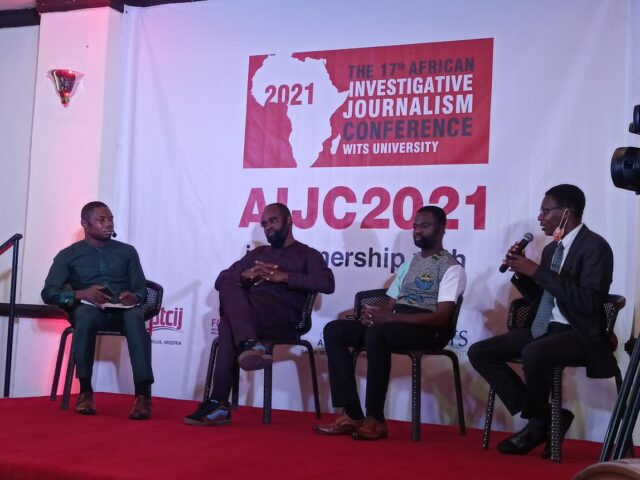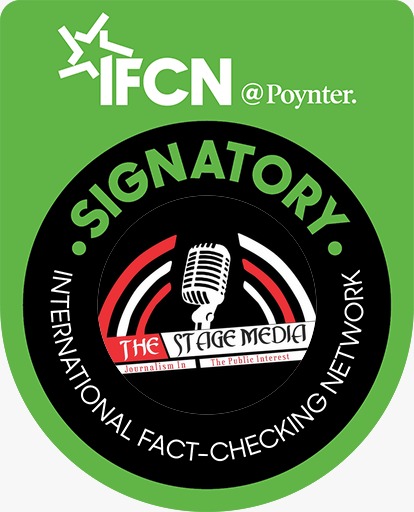
By Bettie Kemah Johnson-Mbayo
Abuja – When Covid-19 struck, African Governments scrambled to get information about the pandemic to citizens and in their panic to curb the spread, many governments flouted their own procurement laws, some saw this as an opportunity to raid the public purse.
While citizens feared for their lives, government officials seized an opportunity to spend public funds recklessly and mismanagement of public funds became the order of the day often under the guise of ‘saving lives’.
In Nigeria, an App was developed for 300 thousand naira, but the government overstated the amount to 90 million naira, with the remaining amount still unaccounted for.
At the same time in Ghana, the government used a middleman from Dubai to procure a Covid-19 vaccine. However, the price of the procurement varies, an indication of a breach of procurement law.
At the 17th African Investigative Journalism Conference in Abuja, four investigative journalists shared a panel on how to uncover the spending of Covid-19.
Ajibola Amzat, Editor, International Centre for Investigative Reporting (ICIR), Nigeria, Manasseh Azure Awuni, Editor-in-Chief-The Fourth Estate, Joshua Olufemi, Chief Executive Dataphyte and Ini Ekott, from the Premium Times for Investigative Journalism, sat ona panel that shared examples of reckless spending by governments during the pandemic.
Ajibola said his institution saw that the Covid-19 procurement was compromised and the government in Nigeria was not transparent when detailing its Covid-19 spending.
“We looked at the prices of thermometers and noticed that the government’s price of a thermometer was higher than what we saw on Amazon. To track Covid-19 funds, one needs to review the records.”
The ICIR editor said, journalists must continue to ask government the questions because ordinary citizens do not have the medium to question their government.
“It is the right of the people to know what is going on and if journalists do not investigate, the public will not know,” said Ajibola’.
Ekott urged journalists to follow the trail of money despite the absence of a tool that accurately tracks Covid-19 spending.
“If someone takes government money, it is something that the media must report and those who are handling public activities must be held accountable,” he said, recalling that when the government of Nigeria was asked about Covid-19, they referred everyone to an App.
“The government told citizens that they created an app to help track Covid-19 cases for the amount to 90 million naira. Our team at PTCIJ decided to contact the (App developing) company, in no time the government disclosed that only 300 000 naira had been spent. I can say till today we do not the where the (rest of the) money is.”
Awuni said at first the Ghanaian government demanded US$150 for a Covid-19 test until recently, when ECOWAS mandated regional countries to charge US$50.
He recalled a company that was formed when compulsory testing was ordered by the government.
“Our borders were to be open and everyone needed to be tested, no other company was given a contract except this new resurrected company that had a link to the Virgin Islands and had a Nigerian man fronting for it. We still do not know the full information of the company despite many FOI’s filed.”
Awuni explained that when Covid-19 struck, almost all budgets of ministries department were re-directed to Covid-19.
“In 2020, there was an election and everything was a PR stunt. When it comes to accountability and transparency it is still impossible even though there is a right to FOI, the implementation is impossible. I have written to the Ministries of Health and information but have not received any responses,” he said.
Meanwhile, Olufemi and Ekott encouraged journalists to collaborate to ensure that journalism is in the public interest.
Olufemi said data released by the government was helpful to initiate an investigation. “We rely on the data the government gives us and we use online searches to compare it and that enables us to establish the authenticity of the data.”
“The government data was useful but it was inadequate. There are instances were billions and millions are used but there is no actual item (bought), and it is your responsibility to search for the right data,” warned Olufemi.
Additionally, he said it is easy to find out how much the government receives but difficult to detail the expenditure of the said amounts.




